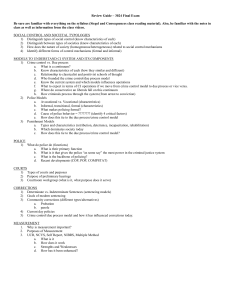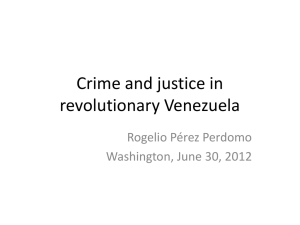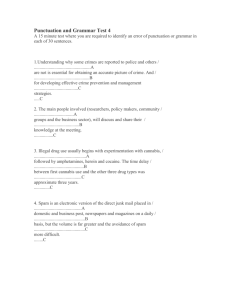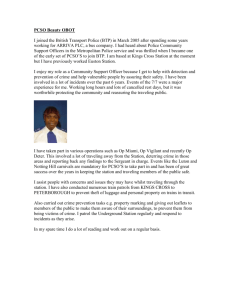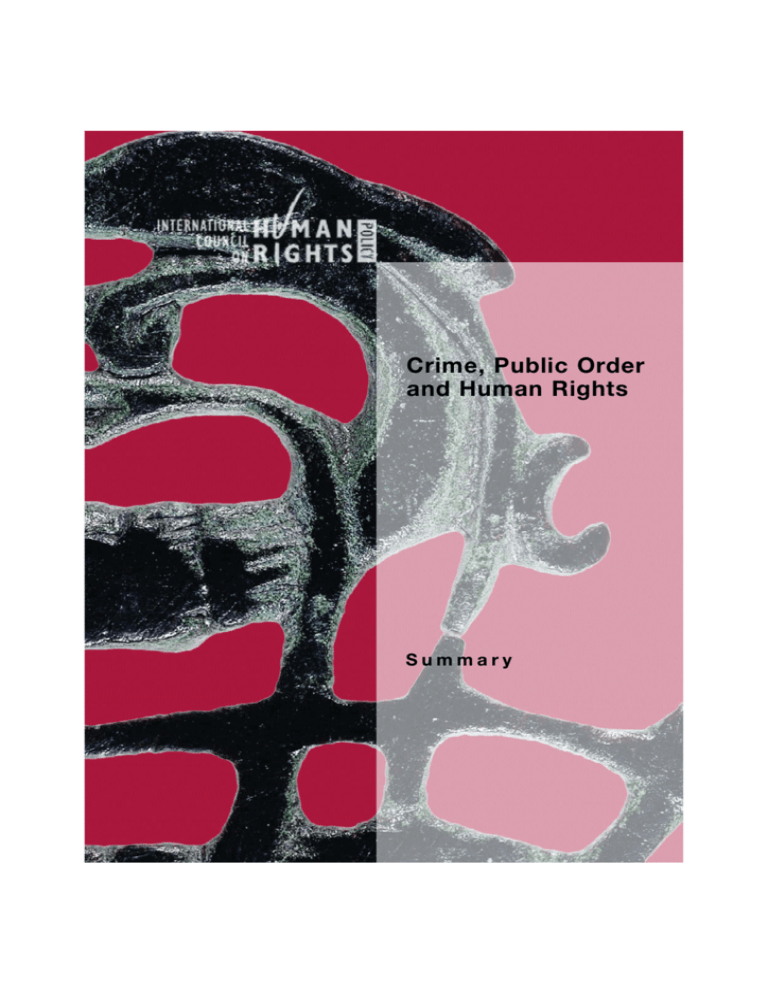
Crime, Public Order
and Human Rights
Summary
THE ISSUES
How have human rights organisations coped with the various problems that
arise when crime levels increase following a transition from authoritarian or
totalitarian to democratic government and there is popular support, as a re s u l t ,
for severe law and order policies? How have human rights workers dealt with
these issues conceptually, what problems have they experienced and what
would make their work more legitimate and effective in terms of policy? What
role can civil society organisations play in re f o rm of public institutions, such as
police?
These are the starting points of a re p o rt by the International Council,
summarised here. It discusses the new discourse that has developed,
emphasising crime as a threat to individual personal security and a potential
s o u rce of state instability. The main aim of the study is to analyse the challenges
that human rights groups must address in the context of rising crime. The re p o rt
examines five case studies of countries that have experienced serious problems
of crime — Argentina, Brazil, Nigeria, South Africa and Ukraine — considering
these societies at diff e rent phases in a transition process, and seeking to draw
diff e rent lessons from each.
W h e re crime is a problem, a pattern has indeed often emerged wherein as a
result of rising crime, hardline law and order policies attract public support.
Increasingly, punitive and authoritarian methods of control and punishment are
suggested or implemented without much public opposition. The re p o rt, thus,
focuses on the role of civil society and the particular issues it faces in this
environment. The varied responses of the state — from collaborative efforts with
civil society to attacks on rights groups, tolerance of police abuse or vigilantism
— provide the context in which rights groups must manoeuvre .
The re p o rt also probes into the sense of insecurity triggered by enhanced fear
of criminal violence to examine how it is produced, fostered and, hopefully,
c o n t rolled or limited. It seeks to understand what constraints these perceptions
impose on rights activists and how they have responded. The re p o rt argues
that, faced with the failure of the state to ensure the security of its citizens,
rights groups have adopted a number of approaches, ranging from continued,
exclusive focus on the oversight or watchdog function to collaborative eff o rts to
provide security services jointly with state authorities, to the development of
novel forms of public discourse that de-emphasise human rights and address
security in broader terms.
The re p o rt includes recommendations that are re p roduced here .
RESEARCH PROCESS
The re p o rt summarised here is the result of a re s e a rch project that began in
June 2002 to examine problems that arise for human rights organisations when
surges of criminality occur in countries that are emerging from periods of
violence, and identify responses to those problems. Initial consultations and
preparatory work took place in 2001, with a focus meeting held in November
2001 in Geneva with a small group of international experts. Between June and
November 2002, the principal re s e a rcher conducted re s e a rch and interviews
with human rights activists and officials in Brazil, Nigeria, Peru, South Africa,
Ukraine and the United States.
In parallel, teams of researchers based in Argentina, Brazil, Nigeria, South Africa
and Ukraine pre p a red re p o rts on how the issues of crime, societal change and
the responses of human rights organisations have been playing out in their
respective countries. The two tracks of re s e a rch were reviewed at an
international seminar organised in co-operation with the Carnegie Council on
Ethics and International affairs on October 21-22, 2002 in New York at which
the re s e a rch team was assembled and joined by several other specialists.
Following that seminar, a draft re p o rt was sent out for comment internationally
in March-May 2003 to over four hundred organisations and individuals. As part
of that consultation, meetings were held in Kiev, with the Intern a t i o n a l
Renaissance Foundation, and in Pretoria, to discuss the issues with human
rights organisations, officials and scholars. The comments received during the
consultation phase were woven into the final re p o rt, which was edited between
July and October 2003.
A five-member Advisory Group provided guidance and direction to the re s e a rch.
The group held periodic consultations to review pro g ress of the re s e a rch and
advise on its direction.
ACKNOWLEDGEMENTS
James L. Cavallaro, Associate Director of the Human Rights Programme and Lecturer on
law at the Harv a rd Law School, re s e a rched and wrote the re p o rt summarised here.
Mohammad-Mahmoud Ould Mohamedou, Research Director at the International Council
on Human Rights Policy, directed the project and edited the re p o rt.
An advisory group guided the re s e a rch. Its members were:
Carlos Basombrío
Former Vice-Minister of Interior of Peru, and former Director of the
Institute of Legal Defence, Lima
Stanley Cohen
Professor of Sociology at the London School of Economics and
Political Science, London
Kakuna Kerina
Executive Dire c t o r, Open Society Initiative for West Africa, Dakar
Rachel Neild
Senior Associate and Director of the Civil Society and Citizen
Security Project, the Washington Office on Latin America,
Washington, DC
Leigh Payne
D i rector of the Legacies of Authoritarianism project, International
Institute, University of Wisconsin-Madison, Madison
The following re s e a rchers pre p a red case studies: Gustavo Federico Palmieri and Cecilia
Ales (on Argentina), Andressa Caldas and Sandra Carvalho (on Brazil), Innocent Chukwuma
and Kole Shettima (on Nigeria), Narandran Kollapen and Makubetse Sekhonyane (on South
Africa), and Halyna Senyk (on Ukraine).
C l i ff o rd Shearing wrote a background thematic re p o rt .
Meetings were held in New York, Geneva, Kiev and Pretoria at which the following people
p rovided input and discussed the re s e a rch: Robert Archer, Joanne Bauer, Oleksandr
Betsa, Tatiana Bukalova, Markian Duleba, Fairouz El Tom, Ayesha Imam, Adam Isacson,
Tatiana Khmyz, Liudmila Klochko, Anatolii Kostruba, Marcia Kran, Roman Kuibida, Fiona
MacAulay, Taras Malyshkov, Jess Messer, Michael Ratner, Dennis Rodgers, Roman
Romanov, Joe Saunders, Wilfred Schärf, Maryna Selivanova, Halyna Senyk, Oleksander
Shvaliuk, Zenovij Siryk, Valentyna Telychenko, Tatiana Yablonska and Vo l o d y m y r
Yavorivsky.
We thank all of these individuals for their co-operation. We are also grateful for the expert
input of several outside readers who commented on a draft re p o rt circulated internationally
in the spring-summer 2003.
We wish to thank the Ford Foundation (New York), the Swedish International Development
Co-operation Agency (SIDA), the Netherlands Ministry of Foreign Affairs, the Open Society
Institute, OXFAM (United Kingdom), CAFOD (United Kingdom), Christian Aid (United
Kingdom) and Professor Walter Kälin for the financial support provided to this re s e a rch.
© 2003 International Council on Human Rights Policy, Versoix, Switzerland.
All rights reserved. ISBN 2-940259-37-2
Cover illustration: © The British Museum. Brooch in the Urnes style. Viking, 11th century AD. Found near the village
of Kiaby, Skåne, Sweden.
Design and layout by Brightideas, Geneva, Switzerland.
Printed by Atar Roto Presse SA, Geneva, Switzerland.
FINDINGS
Definitions and standards
The report focuses on public perceptions of violent crime that occur in city streets, alleyways,
roads, highways and other public areas. This definition excludes important types of crime,
including domestic violence, organised crime and white-collar crime. These crimes are clearly
important in transitional and non-transitional societies. We focus on public crime because it
is this form of crime that shapes public attitudes to criminality and insecurity. These attitudes,
as the report illustrates, are at the heart of the environment in which rights groups must work.
The struggle against domestic violence often requires activists to press police authorities to
intervene in contexts where they are unused to doing so. By contrast, the battle against crime
often requires activists, in ways they are not used to doing, to call for intervention by the
police. Classically, human rights activists monitored police behaviour to prevent abuse of civil
and detainees’ rights. Sharp increases in crime tend to make the discourse of rights defence
less popular, and trigger the set of difficulties analysed in this study.
The fundamental rights at stake when state agents seek to enforce the law are primarily those
guaranteeing the life and physical integrity of suspects, as well as the right to privacy (that is,
to be free from arbitrary searches and seizures). When defendants enter into contact with
authorities responsible for detention and prosecution, other protections may come into play,
such as the right to humane conditions of detention as well as relevant judicial guarantees.
These rights are recognised in the Universal Declaration of Human Rights and enshrined, in
broad terms, in the International Covenant on Civil and Political Rights (ICCPR). Regional
human rights treaties from the European, Inter-American and African systems protect these
same rights in comparable language.
At the same time, states have a duty to protect the security of citizens. International treaties
and other instruments, and the special mechanisms established by the Commission on
Human Rights and other United Nations bodies have developed these rights further. As they
move from operating in authoritarian environments where police powers were used to
suppress legitimate dissent, the need to address detainees’ rights in the larger context
becomes apparent, setting new challenges for human rights defenders.
Change and rising crime
Data from a number of countries demonstrate a correlation between the process of transition
and rises in measured rates of criminal violence. In this project, information was mainly
collected from several Latin American and Sub-saharan African nations and former Soviet
states over the period 1980-2000.
Unable to rely on repressive policing methods and lacking security institutions that have the
skills to operate within the constraints of democratic government, transitional regimes
frequently fail to control crime. This leads to a widespread public sense of insecurity that
makes the defence of fundamental human rights more difficult. Many countries, including
consolidated democracies, face similar types of problems. Where countries have a past
history of authoritarian rule, the problems associated with crime are likely to be heightened.
In such countries, the authorities are more easily tempted to revert to authoritarian solutions,
for which elements of public opinion will be nostalgic. Cultures of violence are likely to be
prevalent within police forces and communities. Former armed groups may become active in
criminal networks or repressive private security apparatuses. Other exacerbating factors
include chaotic urbanisation, the precariousness of major city services, sustained disparities
between rich and poor, the swelling influence in social life of gang activities, the availability of
weapons and drugs, the effects of the demobilisation of military or rebel groups, social
dislocation, systemic discrimination, and the abuses and corruption of the police. Where, in
addition, public institutions are illegitimate and governments have traditionally ruled by force
rather than by consent these problems are compounded.
At the same time, the problems that crime creates for human rights organisations vary
considerably in different societies. This is because relatively stable governments of all colours
— democratic and authoritarian — develop arrangements for maintaining law and order in
which the state provides policing and justice services and accepts its duty to uphold the rule
of law.
These arrangements will deliver some level of security. Typically, the distribution of security
services is correlated with wealth — the wealthy tend to receive greater security than the poor.
And some levels of disorder — varying from place to place — within countries is regarded as
normal. This comes to be accepted as a benchmark for assessing the degree to which any
new regime effectively provides security.
Police forces in authoritarian states tend to suppress criminality as well as dissent, and they
are widely perceived to be effective at crime control. Of course, this control — to the extent
that it is not simply a misperception — is usually achieved at a high cost to individual rights
and the rule of law. The report’s case studies show that police in all the states examined used
repressive and frequently brutal methods, including torture and summary execution of
suspects.
The reform or abolition of old security structures can create a security vacuum. When, as a
result, crime rises, many people demand more effective policing. There is often considerable
anger among those who have been victimised as they blame the authorities or the reform
processes for their suffering. They may or may not be justified in doing so, but such collective
anger shapes the demand for more effective law and order. One common way in which it
does this is through a demand for retribution.
The dynamics of public outrage
The problem of addressing crime in a human rights context is rendered more difficult when
security apparatuses (used by previous repressive governments to control political dissent
and crime) are dissolved and replaced by formal agencies that lack the capacity to cope. The
absence of effective policing and law enforcement, combined with public frustration, can
trigger the emergence of vigilantism.
Faced with rising crime (or the perception that crime is rising), people who believe themselves
to be at risk seek simplistic, often harsh solutions. In this context, those who defend the rights
of criminals — or who approach punishment from a non-retributive perspective (that is, one
not driven by the desire for vengeance) — may be considered to be sympathetic to criminals.
As the desire for revenge intensifies (either due to increased frequency of criminal acts or the
gruesome nature of particular crimes), so does the animosity directed at rights defenders and
others who oppose retribution. Three factors influence the extent to which these perceptions
constrain the work of rights defenders.
n
First, politicians may seize on public security as an issue to be exploited for political gain.
In this context, intelligent, reasoned discourse on public security may be stifled by
inflammatory ‘law and order’ or ‘tough on crime’ rhetoric.
n
Second, as a result of media, political and other pressures, public opinion may view the
defence of human rights as equivalent to the defence of criminals and criminality.
n
Third, people may become so overloaded with information about public security issues
that they may lose interest in the issue and become disillusioned and cynical — no longer
willing to distinguish between officials and criminals and unwilling to believe that things
will improve.
Hardline policies. Governments often respond to crime by introducing policies that offend
human rights principles and put civil liberties at risk. In Nigeria, for example, official response
to crime has prioritised militarised sweeps into poorer communities. Soldiers have been
deployed to quell civil unrest. Authorities have also given security agencies sophisticated
weapons and reintroduced ad hoc security taskforces. Those whose rights are most
immediately endangered when such measures are introduced are individuals alleged to have
committed crimes. Putting such laws on the statute book can eventually weaken the rights of
citizens more widely. Authorities usually adopt these policies without collaboration or
consultation with human rights groups, who, by and large, oppose such measures. It should
be noted that some civil society groups, such as some victims’ rights groups, support
hardline approaches to criminality. These advocate mandatory sentences and increasing the
severity of punishment. They may criticise rights defence and defenders (in the media and
elsewhere). In extreme cases, there may be approval of police violence and even summary
executions of suspects.
Attacks on rights defenders. Where public outrage against crime leads to the demand for
harsh retributive justice, those who defend rights and the rule of law (implying fair trial and
imprisonment, not vengeance) become vulnerable to attack, not only from police officers and
victims’ rights groups but also from politicians seeking to seize political advantage. Those
who defend human rights are often accused of protecting criminals and ignoring the rights of
victims. They are blamed for hindering the police and obstructing rapid justice. In Brazil, for
instance, the state secretary of public security from 1995-1998 referred repeatedly to
international rights groups as “alienígenas” or “space aliens” and claimed human rights were
only concerned with protection of criminals. Similarly, massive rallies were organised in
Argentina in defence of police (and against rights defenders), and South African human rights
defenders are often depicted as ‘advocates of criminality’.
Negative media portrayal. Journalists and media institutions frequently disregard human
rights standards, both in the way they present the facts and in the way they understand and
frame issues. This is especially relevant in relation to crime because many popular media
outlets devote disproportionate attention to public crimes. In doing so, they frequently distort
the legal and moral issues that crime generates, deepen the sense of public insecurity
(whether or not crime is in fact increasing) and promote irresponsible or simplistic policy
solutions for dealing with the problem.
The role of the state
States have human rights obligations to people under their jurisdiction. These include the
obligation to protect their security and provide services that prevent crime and violence
against the person, including abuse of the rights of detainees. On this issue, therefore, the
role of the state is crucial because governments police crime and provide justice. The core
issue in countries that are experiencing important societal transformation is the state’s failure
or inability to protect its citizens and provide an effective justice system, including efficient and
legitimate policing, rapid and accessible legal recourse, and appropriate protection and
compensation for people injured by crime.
Our research demonstrates that government policies in the transitional period do play a
critical role in the exacerbation or suppression of crime, and strongly influence public
perception of security and human rights. Not addressing these issues carefully has led many
governments to fail in areas vital to the success of any democratic transition. Thoughtful
policies both help to control criminal violence and maintain public respect for human rights.
If the state is a potential abuser of the rights of people who are falsely or properly detained
for crimes, it is also a provider of services essential to justice and to the protection of life and
property. Providing security and tackling crime go hand-in-hand and require effective
governance across the justice sector as a whole. Yet, as noted, governments that emerge
after periods of authoritarian rule are weak precisely in these areas of governance. The police
service may be violent, inefficient and unaccountable; the judiciary may be weak or corrupt;
the prison system is likely to be overcrowded and brutal; and public attitudes to these
institutions mistrustful.
In the societies studied, many human rights organisations have therefore had to consider
whether, in the context of a reforming state, they should continue to focus on critically
monitoring the state for abuses, or should participate in helping the state to reform itself. The
predicament is about addressing the state’s function as well as its behaviour. To what extent
and under what conditions should a human rights organisation work to strengthen the
capacity of the state to deliver basic services that are its responsibility? When is refusal to
collaborate warranted or necessary? What should the state do (and civil society not do)?
What level of abuse by officials justifies withdrawal? These are among the questions that
NGOs must pose themselves as they strategise their responses.
Responses of human rights groups
What lessons can be learned for rights defenders who may encounter situations of the kind
described here? As one project interviewee noted, “in a context [in which] the demand for
police effectiveness is often viewed to be at odds with due process… [human rights
advocates must] argue point for point why adherence to due process is a necessary
prerequisite for police effectiveness”.
Faced with the challenges posed by rising crime and increased public sentiment of insecurity,
rights groups have responded in a variety of ways. Their responses are conditioned primarily
by the context in which organisations work. While, for instance, Nigerian rights groups face
challenges to the very idea of the rule of law when they confront well-structured, officially
condoned and popular vigilante groups, Ukrainian activists battle against a culture of state
impunity and apathy. In Argentina, Brazil and South Africa, rights groups must also cope with
indifference and vigilantism, but in addition they have to deal with media-fanned perceptions
that they are defenders of criminality.
In all these societies, human rights activists must consider how best to deal with state
authorities, both on an individual and institutional basis. In considering what level of
engagement with police and other criminal justice system actors is appropriate, they must
manage two key dimensions that cut across all contexts:
n
the need to engage with processes of reform versus the need to remain independent;
and
n
the need to defend principles of human rights versus the need to build public support for
human rights.
These dilemmas shape the responses of rights organisations — but also the perceptions of
peer organisations, government and the public at large. Responses can be divided into three
broad categories:
n
Oversight activity covering legal approaches at domestic level, advocacy (with different
audiences), documentation and reporting. Within these broad watchdog functions, a
number of strategies and responses enhance the effectiveness of techniques that
denounce abuse by state agents. The principal approaches include the multiplication of
oversight capacity (for example, training programmes that enable communities to
denounce instances of police abuse); the advocacy focus on innocents (many
organisations expressly limit their mandate to ‘innocent’ people because the general
public and the media are more sympathetic to such cases); the personalisation of
victims (to establish a link between delinquency and structural conditions in order to
improve understanding and undermine the idea that specific groups are enemies of
society); publicising statistics on rights abuse (by means of systematic documentation,
apparently isolated episodes acquire impact and can be viewed as part of a widespread
practice); and conducting advocacy at the international level (particularly when national
and local authorities are indifferent or hostile to suspects’, defendants’ and prisoners’
rights and the media identify with these positions, rather than those advocated by rights
groups).
n
Collaborative efforts with public authorities. This refers to a range of activities,
initiated by state authorities or by civil society groups, that involve collaboration between
the two. The extent of collaboration varies; the critical element is the presence of a cooperative relationship between security forces and civil society participants. Such cooperation usually marks a clear departure from the pre-reform period, which was
normally characterised by an exclusively confrontational relationship between state
agents and civil society groups.
In some places, police have embarked on community policing projects, for example,
and (though there is no consensus as to the effectiveness of such form of policing) NGOs
have often been the driving force behind such initiatives. Many rights groups have also
become engaged in police training, usually of two kinds: efforts to instruct police officers
in human rights law, and efforts to ensure that, in their daily activities, the police respect
fundamental rights and the rule of law. Some programmes have also focused on
instructing officers in how to carry out their duties effectively consistent with their legal
and constitutional obligations (law enforcement that respects rights). Other rights
groups have developed policy jointly with government authorities. These efforts have
met with varying degrees of success. In general, they have been more successful in
setting priorities than implementing programmes. Brazil’s National Human Rights
Programme (Programa Nacional de Direitos Humanos, PNDH) is a case in point.
n
Broad engagement in the security debate. For rights activists, participating in the
security debate entails a sensitive foray into uncharted territory. They must deal with
security institutions they mistrust. They must build capacity in areas where they may
have little or no experience. They need to evaluate difficult options in relation to security
management. Engaging in security debates whose terms are decided by government
and by those that demand harsh law and order policies also creates the possibility that
the security concerns of rights organisations may be marginalised. Despite these pitfalls,
some degree of engagement has become increasingly necessary. Mostly, broad debate
on public security issues requires not only quantitative and qualitative understanding of
what is wrong with current models, but also appreciation of how public security works in
practice and how it could work better. As groups engage more completely in the public
security debate, they also need to understand the day-to-day nature of police work.
RECOMMENDATIONS
Advice to the public security human rights community
n
Reflection and self-criticism. Human rights organisations should reflect on their
approach and consider developing new strategies for addressing rising crime in ways
that both protect the due process safeguards for criminal suspects and address the
community’s concerns for safety and security. Such a reflection might involve a selfconscious evaluation of the merits and drawbacks of established methods, and consider
the pros and cons of other approaches.
n
Create more effective security networks amongst human rights NGOs. A more selfconscious understanding by rights groups of the diversity of their approaches to issues
of criminality and rights defence might allow them to see their work as complementary.
While groups will wish to retain their independence and the features that make them
unique, this does not prevent co-operation.
Advice to watchdog groups
n
Focus on cases that can transform public opinion. There are advantages in focusing
attention on high-profile cases that have the potential to transform public opinion.
Personalising the victim and focusing on less culpable victims should not cause key
issues to be marginalised, and rights groups should continue to defend the rights of all
persons, including those who have committed criminal offences.
n
Demand rigour and include quantitative analysis in re s e a rch and reporting.
Professional criteria must be applied to NGO re s e a rch techniques and data
documentation to give reports and petitions credibility. This implies continued work in
capacity building. It is critical that rights groups should be able to present coherent,
rational and scientific responses to emotional and irrational arguments about criminality
and law and order.
n
Work closely with the media. Rights groups should use media outlets as a platform to
inform people of their legal rights and the importance of respecting those rights. Creating
close ties with the print and broadcast media will help educate the public on human
rights issues, reduce negative media portrayal and enrich debates about human rights
and public security.
n
Work closely with allies within the state. State institutions charged with oversight of the
criminal justice system, such as ombudsmän offices or prosecutors, may make excellent
partners for investigating and denouncing official abuses. Other bodies, such as
legislative human rights commissions at federal, state or local level can also prove to be
important allies for civil society groups.
Advice to groups seeking broad engagement in the security debate
n
Hone technical understanding of public security issues. Human rights
g roups should better understand the institutional obstacles to effective
public security policies. Organisations re q u i re a precise understanding of
complex policy issues. They must hone their advocacy skills in order to
lobby for legislative changes and legal mechanisms consistent with
democratic institutions.
n
Focus on innovative human rights education and consciousness raising.
NGOs should mobilise public opinion in innovative ways that move beyond
conventional means such as re p o rt writing and casework. Conventional
means of communication are often not sufficient. Rights groups should
employ many approaches such as imagery, music and theatre to influence
public attitudes to crime and security issues.
n
Highlight positive police practices. To overcome police distrust for human
rights work, human rights groups can emphasise examples of positive
police work and techniques. Human rights defence should be seen to
s u p p o rt good policing, and not merely to criticise abusive practices.
n
Monitor legislation. NGOs should develop or strengthen their capacity to
monitor the legislative process effectively. Proactive monitoring of legislation
helps prevent the promulgation of weak or ill-considered legislation. NGOs
might establish parliamentary monitoring bodies to track debates, hold
media briefings, collect documentation from parliament and pre p a re
submissions on proposed legislation at an early stage.
Advice to groups engaged in collaborative efforts with public authorities
n
Focus human rights training on practical skills rather than (merely) on legal
norms. Training in and knowledge of human rights should be an integral
element of training for all law enforcement personnel. Training should be
accompanied by programmes to improve service delivery and
professionalise the police service.
n
Facilitate access to justice. NGOs can help improve public access to the
criminal justice system. The justice system and its processes are complex
and, particularly in societies where levels of functional literacy are low,
NGOs can ensure that members of the public understand the system, know
what their rights are and are assisted to enforce their rights.
n
Hold parliamentary workshops. Rights groups should work to develop
workshops with parliamentarians on international and national human rights
s t a n d a rds in general, and on law making particularly in the face of public
pre s s u re to pass draconian measures that may violate these standards.
ORDER INFORMAT I O N
Main re p o rt
Crime, Public Order and Human Rights, 2003
ISBN 2-940259-36-4, CHF 40 (Swiss Francs) plus postage. Available in English.
Summary
Crime, Public Order and Human Rights — Summary, 2003
CHF 10 (Swiss Francs) plus postage. Available in English, French and Spanish.
All publications from the International Council are available at www. i c h r p . o rg. Orders can
also be placed by contacting us by email (info@ichrp.org), by telephone at (41 22) 775 3300
or by fax at (41 22) 775 3303.
Other publications by the International Council
Duties sans Frontières: Human rights and global social justice, 2003, ISBN 2-940259-33-X.
n
n
Local Rule: Decentralisation and human rights, 2002, ISBN 2-940259-34-8.
n
Human Rights After September 11, 2002, ISBN 2-940259-31-3.
n
Human Rights Crises, 2002, ISBN 2-940259-35-6.
n
Journalism, Media and the Challenge of Human Rights Reporting, 2002, ISBN 2940259-23-2. (Summary available in English, French and Spanish.)
n
Beyond Voluntarism: Human Rights and the Developing International Legal Obligations
of Companies, 2002, ISBN 2-940259-19-4. (Summary available in English, French and
Spanish.)
n
Racial and Economic Exclusion: Policy Implications, 2001, ISBN 2-940259-27-5. (Also
available in French and Spanish.)
n
The Persistence and Mutation of Racism, 2000, ISBN 2-940259-09-7. (Also available
in Arabic, French and Spanish.)
n
Ends and Means: Human Rights Approaches to Armed Groups, 2000, ISBN 2-94025902-X. (Summary available in English, French and Spanish.)
n
Local Perspectives: Foreign Aid to the Justice Sector, 2000, ISBN 2-940259-04-6.
(Summary available in English, French and Spanish.)
n
Performance and Legitimacy: National Human Rights Institutions, 2000, ISBN 2940259-03-8. (Summary available in English, French and Spanish.)
n
Hard Cases: Bringing Human Rights Violators to Justice Abroad — A Guide to
Universal Jurisdiction, 1999, ISBN 2-940259-01-1. (Also available in Spanish.)
n
Taking Duties Seriously: Individual Duties in International Human Rights Law — A
Commentary, 1999, ISBN 2-940259-00-3.
USEFUL WEBSITES
www.cels.org.ar/english/index.html
The Centre for Legal and Social Studies fosters and protects human rights and the rule
of law in Argentina.
www.cleen.kabissa.org
The Centre for Law Enforcement Education promotes respect for human rights in
Nigeria.
www.crime-prevention-intl.org
The International Centre for the Prevention of Crime assists cities and countries to
reduce delinquency and insecurity.
www.criminology.utoronto.ca
The Centre of Criminology at the University of Toronto studies crime from a variety of
disciplinary perspectives.
www.csvr.org.za
The Centre for the Study of Violence and Reconciliation is a multi-disciplinary South
African non-governmental organisation.
www.global.org.br
The Global Justice Centre promotes social justice and human rights in Brazil.
www.heuni.fi
The European Institute for Crime Prevention and Control works with a network within
the United Nations Crime Prevention and Criminal Justice Programme.
www.icclr.law.ubc.ca
The International Centre for Criminal Law Reform and Criminal Justice Policy conducts
international policy research.
www.iss.co.za
The Institute for Security Studies conceptualises, informs and enhances the security
debate in Africa
www.unafri.or.ug
The United Nations African Institute for the Prevention of Crime and Treatment of
Offenders.
What problems arise for civil society when surges of
criminality occur, or when crime is perceived to intensify
in periods of change? What responses and strategies
can be identified?
The re p o rt summarised here examines the problems that
arise for human rights workers when there is public
demand for severe law and order policies to curb crime,
and asks what would make their work more legitimate
and effective.
Analysing different experiences and offering practical
conclusions, the re p o rt outlines a human rights approach
to the problem of crime that goes beyond traditional
concern with police abuse.
International Council on Human Rights Policy
48, chemin du Grand-Montfleury
P. O. Box 147, 1290 Versoix
Geneva, Switzerland
Tel.: (41 22) 775 3300
Fax: (41 22) 775 3303
ichrp@intern a t i o n a l - c o u n c i l . o rg
www. i c h r p . o rg
ISBN 2-940259-37-2
EAN 9782940259373

